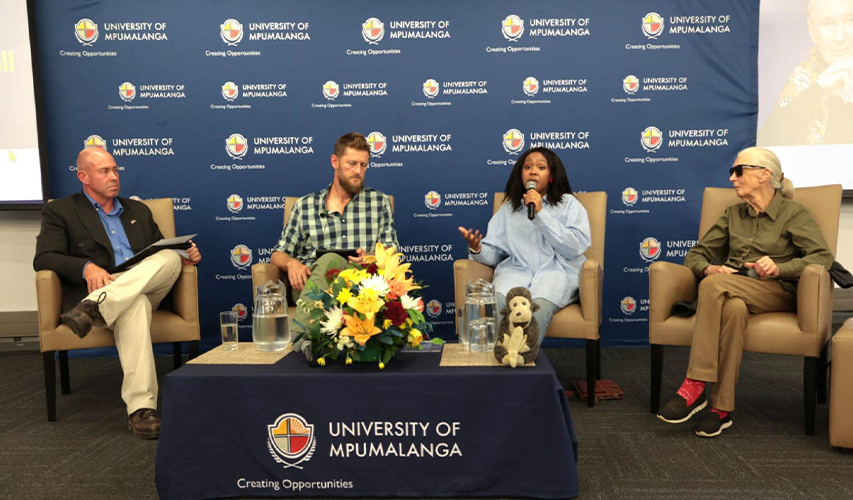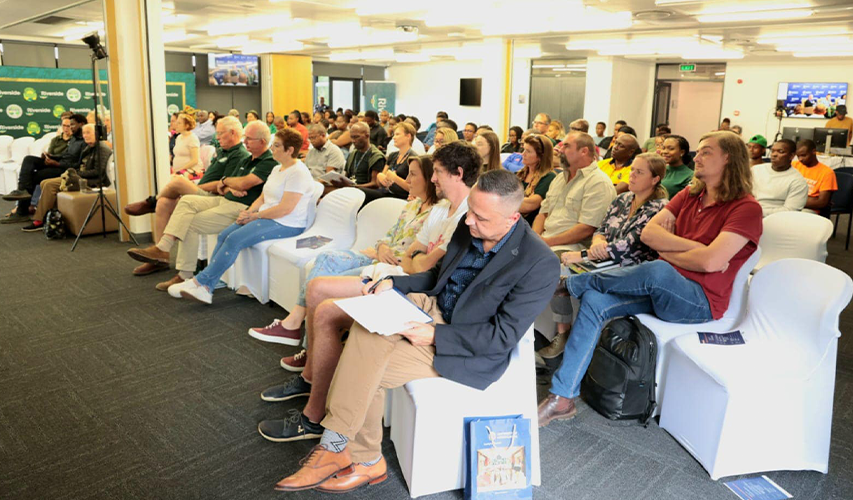As a United Nations Messenger of Peace and a Dame of the British Empire, Dr Goodall's contributions have been recognised and celebrated on a global scale. Her latest endeavour, The Book of Hope: A Survival Guide for Trying Times, serves as a beacon of resilience and optimism in today's uncertain world.
Speaking at the panel discussion titled "Reasons of Hope," Dr Goodall said her mission is to go around the world to instil hope, particularly to young people.
“Everyone has a role to play to make an impact and change the world. It's up to us what sort of impact you want to make. People have different passions. People have different directions in their life," she said.
The panel discussion consisted of UMP academics Dr Tim Forssman and Dr Mwazvita Dalu. They were joined by Dr Jane Goodall. Prof Dan Parker from the School of Biology and Environmental Sciences was the moderator.
Dr Forssman said: “So many of our students are incredibly switched on. They are passionate about heritage. We can make great strides in unleashing and unlocking other youths from the region through our institution to become more passionate about our heritage and history.”
Dr Dalu added: “We have the privilege of doing things our way in our institution. We are at a position where issues of the environment can never be suppressed. We have a very special space, and the youth should have a voice.”
 UMP Academics in conversation with Dr Goodall.
UMP Academics in conversation with Dr Goodall.
Collaborations
Prof Dan Parker mentioned that collaboration is one of UMP’s values, noting that “the partnership with the greater Riverside Biodiversity Initiative exists to essentially safeguard biodiversity going into the future.”
Dr Forssman added that there's an interesting collaboration between archaeologists, archaeologists with archaeological evidence on the one hand, and ecologists looking at species dynamics on this particular landscape.
“That helped us to understand human history, but also helped us to understand elephant conservation in that specific region. And so there are cases where we can beautifully blend these two disciplines.”
He further explained that archaeology and conservation happen more or less in the same place, and the two fields intersect from a very basic physical point of view.
“A lot of the skills that we are imparting on our students are the same: how to use GPS, how to record things following scientific principles, and this is a big, big reason behind the institute. The idea is that we can draw from these lovely collaborative lines between our different fields from a training perspective.
“So, these fields I think, do factor in very nicely and when used smartly, can contribute meaningfully to one another because conservation biodiversity ecology impacted humans in the past, and humans impacted ecology, biodiversity, and conservation as well. And so, unpacking those bridges is a really interesting approach,” he said.
Dr Dalu further mentioned that collaborations could lead to synergies and interconnectedness since there are advantages in working together.
“It’s very important to open communication channels and not just leave things to coincidence. You know, even on social media, they call it algorithms. Thus, communication is also something that we have to look in to.”
 The dialogue captured the audience.
The dialogue captured the audience.
About Dr Jane Goodall
Over six decades ago, Dr Goodall embarked on a ground-breaking journey, venturing into Tanzania's Gombe National Park to commence her seminal studies on chimpanzee behaviour. Since then, her research has not only revolutionised the scientific understanding of our connection with the animal kingdom but has also catalysed a global movement toward environmental stewardship and compassion.
In 1977, Dr Goodall founded the Jane Goodall Institute, an organization at the forefront of chimpanzee and habitat protection. Through innovative approaches such as the 'Tacare' conservation model, the Institute has spearheaded community-led initiatives, advancing both scientific research and sustainable conservation practices.
Today, the impact of Dr Goodall's work extends far beyond the confines of academic journals. Through initiatives like the "Jane Goodall Hopecast" and the groundbreaking "Virtual Jane" platform, she continues to inspire and connect with audiences worldwide.
WATCH: Catch the discussion on UMP’s YouTube Channel via this link: https://youtu.be/jov_eTvobIU
Story by Lisa Thabethe. Pictures ChrisplPhoto.